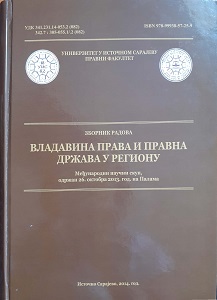ПДВ у Босни и Херцеговини: једна или више пореских стопа
VAT in Bosnia and Herzegovina: One or More Tax Rates
Author(s): Milan Tomić, Đorđe Marilović
Subject(s): Law, Constitution, Jurisprudence, Law on Economics, Public Finances, Fiscal Politics / Budgeting
Published by: Правни факултет Универзитета у Источном Сарајеву
Keywords: Value added tax(VAT);Bosnia and Herzegovina;Taxation;Equity;Tax rate;
Summary/Abstract: Value added tax in Bosnia and Herzegovina (VAT in B&H) has its particularities when compared to VAT in any European state – the law on VAT in B&H has been adopted relatively lately and there is only one tax rate. Therefore, it has been subject of various debates, mostly concerning the need for introducing lower VAT rates.In this article, authors analyze advantages and disadvantages of the single tax rate (except for the zero rate), i.e. the standard tax rate. Political influence on the VAT design in Bosnia and Herzegovina is noticeable, and the interests of social groups which are particularly vulnerable to economic effects of VAT are neglected. The importance of VAT for the revenues of the Institutions of Bosnia and Herzegovina, B&H constituent entities, Federation of B&H (and its cantons) and Republika Srpska, or Brčko District of B&H can not be an excuse for the lack of reaction to VAT’s regressive effects. Authors, therefore, analyze possible solutions to this problem.There are three possible theoretical approaches to the problem: through the VAT system, through the tax system as a whole, and through wider socioeconomic system. Only the first option is reasonable, with regard to VAT in B&H. As a result of the complexity of B&H and the fact that only indirect taxes are introduced at B&H level, while Federation of B&H (and its cantons) and Republika Srpska, and Brčko District of B&H all have separate tax systems and fiscal policies (altogether, 14 tax systems), anything but the first option would have distortive effects. For this reason, authors come to conclusion that lower VAT rates should be introduced, which would lead to more equitable taxation.
- Page Range: 861-870
- Page Count: 10
- Publication Year: 2013
- Language: Serbian
- Content File-PDF

